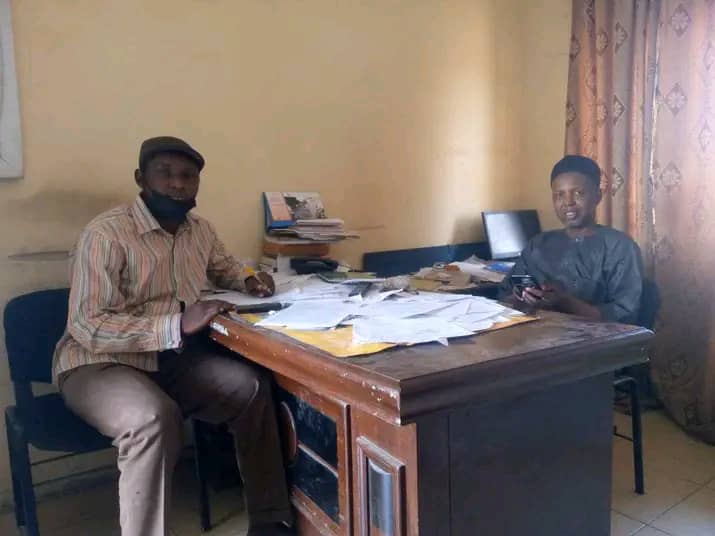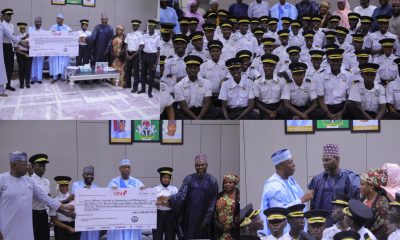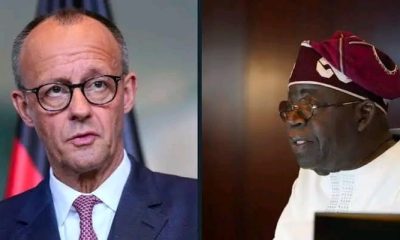Opinion
From Newsroom to Boardroom: How Ali Mamman Shuwa Rose to Lead Borno Radio Television

By Adamu Aliyu Ngulde, Maiduguri
MAIDUGURI, Nigeria — When Ali Mamman Shuwa walked into a modest newsroom in the early 1990s as a fresh-faced reporter, few could have imagined that three decades later he would rise to become the General Manager of Borno Radio Television (BRTV). For 33 years, his name has been synonymous with journalism in Borno — a career marked by resilience, professionalism, and an unwavering commitment to telling the stories of his people.
Shuwa’s journey reflects not just personal determination but also the transformation of the media in Borno State. From the pre-digital era of tape recorders and typewriters to today’s world of instant news and online platforms, he has adapted at every turn. Colleagues say that ability to evolve — while staying true to the ethics of accuracy and fairness — set him apart.
Early Days in the Newsroom
Born and raised in Borno, Shuwa’s fascination with storytelling began early. He joined journalism in the early 90s, a period of political upheaval in Nigeria, where reporters had to balance courage with caution. His first assignments were modest — covering local council meetings and community festivals — but soon he was thrown into more demanding beats: politics, security, and the humanitarian crises that would later define the region.
“I still remember my first big story,” Shuwa once recalled in a newsroom chat. “It was a political rally in Maiduguri. I didn’t even have a proper recorder, just a notebook. But I knew this was the path for me.”
Climbing the Ladder of Borno Journalism
Over the years, Shuwa earned a reputation for meticulous reporting. He was not the loudest voice in the newsroom, but colleagues noticed his diligence — every fact double-checked, every quote carefully verified. As one former editor put it: “Ali never chased sensationalism. He chased the truth.”
From correspondent, he rose to editor and later senior manager, navigating the transition from print reporting to broadcast journalism. At BRTV, he became a familiar presence both behind the scenes and in front of the microphone. Younger journalists admired him not only for his professionalism but also for his willingness to mentor them.
“Many of us learned discipline and newsroom ethics from him,” said Tijjani Mohammed, a reporter at BRTV. “He always reminded us that journalism is not about us — it’s about the people we serve.”
Reporting Through Conflict
Shuwa’s career spanned the toughest years of Borno’s modern history. The Boko Haram insurgency brought unimaginable challenges — displacement, insecurity, and the daily risks journalists faced in telling the world what was happening.
Through it all, he remained committed. “There were nights when we filed reports under candlelight because power was cut off during attacks,” a colleague recalled. “Ali was always there, encouraging us to keep going.”
This resilience built his reputation not only within Borno but also beyond. Media watchers say his leadership at BRTV comes at a time when state-owned broadcasters must redefine their role in an age of digital disruption and private competition.
Steering BRTV into the Future
Appointed as General Manager after 33 years of service, Shuwa now carries the responsibility of steering BRTV into a new era. His vision is clear: modernization, inclusivity, and integrity.
“BRTV has always been the people’s station,” Shuwa said. He added that “My goal is to strengthen that legacy by embracing technology, nurturing talent, and telling the stories of our people with integrity.”
His plans include digitizing the station’s archives, expanding regional coverage, and investing in young journalists to prepare the next generation of broadcasters.
Widely Welcomed Appointment
In Maiduguri, media practitioners and civil society leaders welcomed the news. For many, his appointment represents a recognition of merit and longevity in a profession where dedication is often overlooked.
Governor Babagana Zulum praised Shuwa’s record of service, saying: “Ali Mamman Shuwa has given his life to journalism in Borno. His leadership of BRTV will ensure the station remains a trusted voice for our people.”
Looking Ahead
As Shuwa settles into his office overlooking the city he has reported on for decades, he is keenly aware of the challenges ahead: dwindling public trust in state-owned media, limited resources, and the fast pace of technological change. But those who know him say he thrives under pressure.
For now, his story stands as a reminder that persistence pays off. From the dusty newsrooms of the 1990s to the boardroom of BRTV in 2025, Ali Mamman Shuwa’s career is both an inspiration and a roadmap for younger journalists in Nigeria — proof that a lifetime of telling stories can, one day, make you the story.













